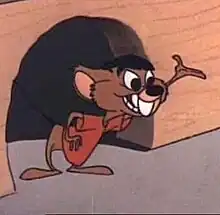Cat-Tails for Two
Cat-Tails for Two is a 1953 Warner Bros. Merrie Melodies cartoon, directed by Robert McKimson and written by Tedd Pierce.[2] The short was released on August 29, 1953.[3] It was the first appearance of Speedy Gonzales, in a prototype form.[4] Because this cartoon's rendition of Speedy Gonzales looked rather coarse, they redesigned him for future cartoon releases.
| Cat-Tails for Two | |
|---|---|
 The still of scene of a prototype Speedy Gonzales, as seen in the short before he was redesigned in later appearances (animated by Charles McKimson). | |
| Directed by | Robert McKimson |
| Story by | Tedd Pierce |
| Produced by | Edward Selzer (uncredited) |
| Starring | Mel Blanc Stan Freberg (uncredited)[1] |
| Music by | Carl Stalling |
| Animation by | Herman Cohen Phil DeLara Charles McKimson Rod Scribner Keith Darling (uncredited) Harry Love (uncredited) |
| Layouts by | Robert Givens |
| Backgrounds by | Richard H. Thomas |
| Color process | Technicolor |
| Distributed by | Warner Bros. Pictures |
Release date |
|
Running time | 7 minutes (one reel) |
| Language | English |
The cartoon has been criticized for its stereotypical and insensitive depictions of Mexicans.[5]
Plot
The two cats pursuing Speedy in Cat-Tails for Two are the slow-witted (and injury-causing) Benny and the fully functioning but unfortunate George, both patterned after the characters Lennie and George in the novel Of Mice and Men. George and Benny are walking down a pier looking for food, when they find a Mexican ship. Figuring the ship will have plenty of Mexican mice, i.e. "Mexican food" (Benny: "It gives me the heartburn and I love it!"), they climb on, only to find an unkempt mouse calling himself "Speedy Gonzales: The Fastest Mouse in All Mexico".
George and Benny go through numerous attempts to capture Speedy, who always outwits them. Speedy comes to think of them as private entertainment, at one point declaring "I like those fellows. All the time having fon (fun)!" Among the cats' failed attempts:
1. A crate full of "Acme Anvils" set above a piece of cheese. With Benny holding the rope and George setting the bait, Speedy gives Benny a scare from behind, causing him to let go of the rope and the crate to flatten George. As punishment, George swings down on Benny's cranium with a mallet, but the mallet bounces off Benny's thick skull and right back on top of his own. When Benny dumbly asks "Why did you hit yourself on the head for, George?", the slap-happy cat replies: "I like it, I like it!!"
2. George sets up seven pieces of cheese with dynamite-stick booby traps throughout the ship, but doesn't have a match to light the sticks. Speedy taunts George with a match and sets him up to take the explosions. Benny comes to the rescue by cooling George down, but misspells a bucket of petrol as "a funny way to spell 'water'," leaving him half furless.
3. A pipe with one end disguised as an entrance way to a cabaret and Benny standing at the other end with a mallet. When Speedy enters the pipe, George fires a skyrocket in behind him, the idea being to force Speedy out into the path of the mallet. But the rocket unexpectedly yanks George through the pipe behind it. Speedy is too fast for Benny, and Benny ends up clobbering George when he is pulled out the other side turning his head into a mallet size.
Finally, the two cats run a pipe into Speedy's hiding place (to the tune of Raymond Scott's Powerhouse), but Speedy grabs a wrench and bends the pipe back around to the cats, unbeknownst to them. George starts shoving a lot of dynamite into the pipe, resulting in a mountain of TNT piling up behind him and Benny. When George is done shoving dynamite through the pipe, he lights the last stick with a match, and the mountain of dynamite blasts him and Benny up into the air. As they descend, Benny asks George about their Mexican dinner, with George responding "I kind of lost my appetite for Mexican food," before both cats plunge into the harbor. A smug Speedy looks at the camera and declares "I love those fellows. They're so see-lee (silly)!"
Voice cast
- Mel Blanc as Speedy Gonzales, George, and Benny's screaming
- Stan Freberg as Benny (uncredited)
References
- Scott, Keith (2022). Cartoon Voices from the Golden Age, 1930-70. BearManor Media. p. 85. ISBN 979-8-88771-010-5.
- Beck, Jerry; Friedwald, Will (1989). Looney Tunes and Merrie Melodies: A Complete Illustrated Guide to the Warner Bros. Cartoons. Henry Holt and Co. p. 252. ISBN 0-8050-0894-2.
- Lenburg, Jeff (1999). The Encyclopedia of Animated Cartoons. Checkmark Books. pp. 104–106. ISBN 0-8160-3831-7. Retrieved 6 June 2020.
- Behnken, Brian D.; Smithers, Gregory D. (24 March 2015). Racism in American Popular Media: From Aunt Jemima to the Frito Bandito: From Aunt Jemima to the Frito Bandito. ABC-CLIO. p. 112. ISBN 978-1-4408-2977-2.
- Behnken, Brian D.; Smithers, Gregory D. (2015). Racism in American Popular Media: From Aunt Jemima to the Frito Bandito. ABC-CLIO. pp. 112–113. ISBN 9781440829772. Retrieved 13 June 2020.